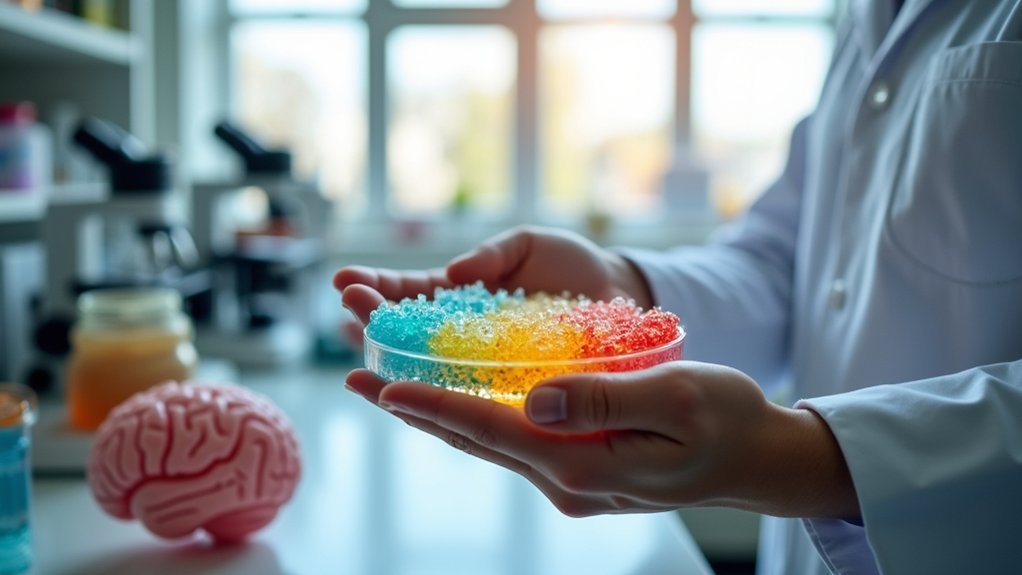Imagine your brain as a sophisticated computer, constantly processing signals from an unexpected source—your gut. You’ve likely never considered that the trillions of microorganisms residing in your digestive system could be instrumental in shaping your mental clarity and emotional well-being. Emerging scientific research reveals a profound connection between your gut microbiome and cognitive function, suggesting that probiotics might be more than just digestive supplements. What if the key to optimizing your mental performance isn’t just in your head, but in the complex ecosystem of your intestinal tract?
Key Takeaways
- Probiotics like Lactobacillus and Bifidobacterium directly influence cognitive function by producing neurotransmitters and modulating the brain-gut communication network.
- Approximately 90% of serotonin, critical for mood regulation, is produced in the digestive tract, demonstrating the profound gut-brain connection.
- Scientific research validates probiotics as promising interventions for mental clarity, with studies showing improvements in emotional processing and cognitive performance.
- Regular probiotic supplementation (1-10 billion CFUs) can help mitigate symptoms of anxiety and depression while supporting psychological resilience.
- The gut microbiome plays a crucial role in mental health by regulating inflammation, neurotransmitter production, and overall neurological function.
Understanding the Gut-Brain Connection

Although often overlooked, the gut-brain connection represents a complex and dynamic communication network that profoundly impacts mental and emotional well-being. The gut-brain axis serves as a bidirectional communication system where your gut microbiota directly influences cognitive function and psychological states. Through this intricate pathway, approximately 90% of serotonin—a vital neurotransmitter for mood regulation—is produced in your digestive tract, establishing a direct link between gut health and mental health.
Stressful experiences can disrupt this delicate communication network, potentially triggering anxiety and depression. Probiotics play a significant role in maintaining this balance, with specific strains like Lactobacillus and Bifidobacterium demonstrating remarkable potential to modulate the gut-brain axis, ultimately supporting mental clarity and emotional resilience.
How Probiotics Influence Mental Health

The intricate relationship between probiotics and mental health emerges from the foundational understanding of the gut-brain axis. You’ll discover that probiotics play an essential role in modulating mental well-being through complex interactions with the central nervous system. By producing important neurotransmitters like serotonin, these beneficial microorganisms directly influence your mood and cognitive function.
Research demonstrates that probiotics can effectively mitigate symptoms of anxiety and depression while improving gut health. They’ve been shown to alleviate irritable bowel syndrome and enhance mental clarity by regulating inflammatory responses and neurotransmitter production. The targeted supplementation of specific probiotic strains offers a promising approach to supporting psychological resilience, highlighting the profound connection between your digestive system and emotional state.
Selecting the Right Probiotics for Cognitive Support

How do you navigate the complex world of probiotics for cognitive enhancement? Your approach should prioritize specific bacterial strains like Lactobacillus and Bifidobacterium, which demonstrate significant potential for mood regulation and mental clarity. When selecting probiotics for cognitive support, aim for supplements containing 1-10 billion CFUs, targeting gut health’s essential role in brain function.
Consider incorporating fermented foods alongside targeted supplements, as these provide diverse probiotic strains that support extensive cognitive wellness. Individual psychological conditions may influence probiotic effectiveness, so personalization is key. Remember that consistent use is vital—cognitive benefits typically emerge after several weeks of dedicated supplementation. Your strategic selection can transform gut health into a powerful tool for enhanced mental performance and neurological resilience.
Scientific Evidence and Research Insights

While groundbreaking neurological research continues to reveal complex interactions between gut microbiota and cognitive function, scientific evidence increasingly validates probiotics as a promising intervention for mental clarity. Specific strains like Lactobacillus and Bifidobacterium demonstrate significant potential in mitigating anxiety and depression symptoms through targeted brain-gut axis modulation. Meta-analytic studies reveal that two-week probiotic supplementation can markedly improve emotional processing and cognitive performance. The intricate relationship between gut health and brain function suggests that strategic probiotic interventions might offer therapeutic benefits for individuals experiencing psychological challenges. Ongoing research meticulously explores the precise neurological mechanisms by which these microorganisms influence mental well-being, indicating a transformative approach to understanding and potentially treating mood-related disorders through systematic microbiota management.
Practical Strategies for Incorporating Probiotics Into Your Wellness Routine

Bridging scientific insights with practical application, individuals can strategically implement probiotic interventions to optimize mental wellness through targeted dietary and supplementation approaches. Start by incorporating fermented foods like yogurt and kimchi, which introduce beneficial bacteria species to support gut health and mental clarity. Gradually introduce probiotic supplements containing Lactobacillus and Bifidobacterium, beginning with 1-10 billion CFUs to minimize potential digestive adjustments. Complement these probiotics with prebiotic foods such as bananas and oats, which nourish beneficial gut bacteria and potentially mitigate anxiety and depressive symptoms. Always monitor your body’s response and consult a healthcare provider before initiating any new probiotic regimen, particularly if you have existing health conditions or are taking medications. Systematic, personalized integration is key to leveraging probiotics’ potential cognitive benefits.
Frequently Asked Questions
What Probiotics Are Good for Mental Clarity?
You’ll want Lactobacillus and Bifidobacterium strains, found in fermented foods, to boost cognitive function, reduce anxiety, and enhance mood through your gut microbiome’s intricate connection with mental clarity and overall brain health.
What Gut Bacteria Is Good for Mental Health?
Sarah’s anxiety improved after adding Lactobacillus and Bifidobacterium strains. You’ll want gut microbiome diversity, focusing on beneficial bacteria that reduce inflammation, support neurotransmitter production, and modulate stress responses through nutrient-rich dietary fiber sources.
How Does the Gut-Brain Axis Affect Mental Health?
Your gut microbiome interaction directly influences neurotransmitter production, modulating stress response and reducing inflammation, which systematically enhances mood regulation mechanisms and cognitive function through complex biochemical signaling pathways in the gut-brain axis.
Can Probiotics Help With Mental Health?
Probiotics can enhance mental wellness by modulating gut flora, potentially alleviating anxiety, improving cognitive function, and supporting mood regulation through neurotransmitter production and dietary sources like yogurt, kefir, and fermented foods.
Conclusion
You’ve uncovered the powerful connection between gut health and mental clarity. By strategically selecting probiotic strains and integrating them into your daily routine, you’ll nourish both body and mind. Embrace fermented foods, consider targeted supplements, and trust the scientific evidence that links your microbiome to cognitive wellness. Your journey to enhanced mental performance starts with understanding and supporting your gut-brain axis.



